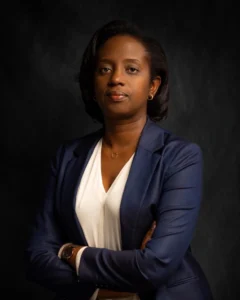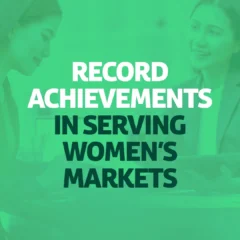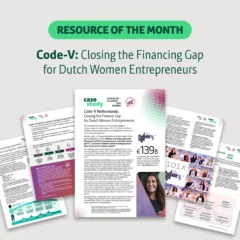
Bank of Kigali is Rwanda’s largest financial institution and a leader in expanding financial access to underserved populations while driving digital transformation and economic growth.
Through two women-focused retail banking products, Bank of Kigali has impacted more than one million women across its extensive branch network. The success of these products led the bank to launch a women’s SME strategy in 2024.
In this interview, Chief Executive Officer Diane Karusisi shares the bank’s approach to serving Women’s Markets.
Alliance: Can you share Bank of Kigali’s market position in Rwanda and the strategic vision for the institution?
Karusisi: Bank of Kigali is the largest financial institution in Rwanda, with an extensive network of 66 branches, 5,500 BK agents and 103 ATMs throughout the country. As we look to the future, we remain dedicated to empowering individuals and supporting businesses while contributing to Rwanda’s growth and prosperity. Our strategic vision focuses on deepening access to banking services, particularly for underserved segments, positioning Bank of Kigali as the bank of choice for all individuals and businesses. We also aim to support digital innovation ecosystems in Rwanda, facilitating a digital shift in payments and enhancing e-commerce, as well as identifying use cases in public transport and entertainment. Additionally, we are committed to driving Rwanda’s economic transformation and sustainability by providing relevant financial solutions to foster private sector-led growth.
Alliance: Focusing on Women’s Markets, please set the context of women’s financial inclusion in Rwanda and then share Bank of Kigali’s strategy for advancing women’s financial inclusion.
Karusisi: Women entrepreneurs in Rwanda are a rapidly growing segment, with 52 percent of MSMEs owned by women (WMSMEs), yet significant barriers to financial inclusion remain. Only half of WMSMEs (51 percent) have bank accounts, and when we look at the overall female population, just 19 percent of Rwandan women have bank accounts.
At Bank of Kigali, our strategy to increase women’s financial inclusion includes expanding reach by increasing the number of women borrowers in the SME sector and offering more accessible, collateral-free loan options. We’re also providing non-financial services to address knowledge gaps, networking gaps, and build confidence. We’re encouraging the use of digital banking tools for easier access and designing SME financial products that address women’s specific needs. Additionally, we’re creating welcoming spaces by establishing dedicated areas for women in our branches to foster a more inviting atmosphere. Through these initiatives, we aim to empower women entrepreneurs and support their growth in Rwanda’s economy.
Alliance: Which customer segments among women are you prioritizing, and what tailored value propositions (financial and non-financial services) do you offer or are you considering offering to them?
Karusisi: We aim to prioritize women-led micro, small, and medium enterprises (W-MSMEs) across various sectors, including general trading, manufacturing, construction, and services.
The value propositions we are considering offering include flexible financing options with short- to medium-term loans for working capital, inventory, equipment acquisition, and business expansion, with amounts varying by customer tier. We’re providing competitive interest rates with fixed rates aligned with market conditions to promote affordability for our clients. We also offer supportive payment structures with repayment plans that spread costs over an extended period, minimizing cash flow strain for women entrepreneurs. We’re working to increase the number of women beneficiaries of our unsecured loans and promote digital banking channels for easier access to our services. In addition to financial products, we are developing training programs and networking opportunities to empower women in business.
Alliance: Having signed on to the WE Finance Code during the 2025 Alliance Summit, how is Bank of Kigali contributing to national strategies and policies supporting women entrepreneurs?
Karusisi: By signing the WE Finance Code, we commit to aligning our initiatives with national strategies focused on financial inclusion and gender equality. We collaborate closely with government policies to empower women economically by enhancing their access to finance and implementing programs that align with national gender equity objectives.
For instance, the National Strategy for Transformation (NST2) aims to expand the use of formal financial services, including digital and electronic payment systems, with a specific emphasis on youth and women. In line with this objective, we are actively increasing access to digital banking channels, thereby enhancing financial opportunities for our clients. We’re focusing on cash flow-based lending to open up borrowing relationships with customers who do not have access to collateral, and providing financial literacy to build capacity of customers and de-risk them, making them more bankable.
Alliance: Digital financial services played a major role in bringing so many women into formal financial services in Rwanda. How is Bank of Kigali leveraging technology to reach and impact women?
Karusisi: At Bank of Kigali, we recognize that technology is a powerful tool for empowering women. We focus on enhancing the adoption of our digital channels, such as Internet banking and BK Pay, to improve the traceability of business cash flows, making women more bankable. We are also aiming to conduct financial literacy workshops in rural areas to help women build confidence in using digital financial tools. Additionally, we are working on offering digital loans that provide easy access to funds, allowing women to manage their finances more efficiently.
Alliance: Collecting and analyzing sex-disaggregated data is critical to understanding and growing Women’s Markets programs at banks. Where is Bank of Kigali in its gender data journey, and how are you using this information to design or refine your offerings?
Karusisi: Bank of Kigali has made significant strides in enhancing the quality, completeness, and accuracy of gender-related data within our core systems. Through our Data Governance framework, we have established clearer data-entry controls, ongoing data-quality monitoring, and regular reconciliation processes to ensure that customer demographic information, particularly gender, is accurately captured and maintained. With the implementation of our new Data Warehouse and Analytics platform, we will generate insights that are disaggregated by sex across key product lines such as deposits, lending, digital channels, and transaction behavior. This will enable us to gain a deeper understanding of the financial journeys of women and identify areas where they may be underserved or encounter specific barriers. Our plan includes cleansing legacy data to ensure gender accuracy, tracking loans and revenues by gender for a comprehensive perspective, monitoring gender representation on dashboards, and assessing the impact of our initiatives on businesses.
Alliance: Workforce gender diversity and inclusion is crucial to effectively serving women customers. Could you provide an overview of female representation within Bank of Kigali and highlight one or two key initiatives that have supported progress?
Karusisi: At Bank of Kigali, we take pride in our commitment to workforce gender diversity and inclusion. Currently, we have 50 percent female representation in our executive committee, and women make up 46 percent of our senior management and management teams.
Our HR policies are intentionally gender-driven, encompassing recruitment, promotion, learning and development opportunities. We aim to create a supportive workplace environment, accommodating women and mothers by offering an additional month of maternity leave and implementing 14 working days of paternity leave. We also provide dedicated mothers’ rooms in our headquarters and newly renovated branches to facilitate breastfeeding.
Additionally, we have established a Gender Committee and a Gender-Based Violence (GBV) Committee with clear guidelines to promote a safe and supportive environment. Women empowerment is a core component of all our initiatives, including our BK Foundation, which focuses on promoting and preparing female talent from secondary school onward. Our ongoing ESG strategy includes various women empowerment and inclusion programs, and we have developed women-oriented products and platforms to support women in business, from start-ups to established enterprises. Through these initiatives, we are committed to enhancing female representation and creating a workplace where everyone can thrive.
Alliance: Youth and young entrepreneurs (defined as up to age 35) represent a vital part of Rwanda’s economy. Does Bank of Kigali have a strategy to support their financial growth, entrepreneurship, and access to opportunities, especially young women?
Karusisi: Rwanda has a very youthful population. In younger age brackets (e.g., 14-19), the sex ratio is near 50:50, but females begin to slightly outnumber males in older youth age groups. For example, women make up 54 percent of the 30-35 age group. By unlocking this market and serving the women population, Bank of Kigali’s strategy for women’s financial inclusion addresses this segment..
Alliance: Why did you decide to join the Financial Alliance for Women, and what are you most looking forward to learning from or sharing with the network?
Karusisi: Joining the Financial Alliance for Women aligns with our commitment to gender equity and financial inclusion. We look forward to sharing insights on our experiences and learning best practices from our peers on the global platform. The collaborative environment provides an opportunity to enhance our strategies and ultimately better serve women entrepreneurs in Rwanda



